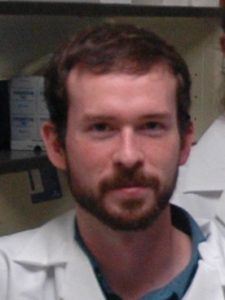Lab alumni and their research projects
| 1. Albert Thayil (Graduated-May 2017) | |
 Albert graduated with BS in Biology degree from the University of North Carolina at Greensboro in spring 2017. During his undergraduate studies, he attended the University of Nicosia Medical School as part of a Cyprus study abroad program. He was a Gene, Environment, and Emotion (GEnE) lab Research Assistant for the Psychology Department before joining Bhandari Research Group in the Department of Biology. His “Senior Honors Thesis” project was focused on transgenerational molecular changes in the reproductive axis (brain-pituitary-testis) of medaka induced by developmental exposure to environmental chemical, Bisphenol A (BPA). His project was funded by UNCG, National Institute of Health, and US Geological Survey. Albert graduated with BS in Biology degree from the University of North Carolina at Greensboro in spring 2017. During his undergraduate studies, he attended the University of Nicosia Medical School as part of a Cyprus study abroad program. He was a Gene, Environment, and Emotion (GEnE) lab Research Assistant for the Psychology Department before joining Bhandari Research Group in the Department of Biology. His “Senior Honors Thesis” project was focused on transgenerational molecular changes in the reproductive axis (brain-pituitary-testis) of medaka induced by developmental exposure to environmental chemical, Bisphenol A (BPA). His project was funded by UNCG, National Institute of Health, and US Geological Survey.
Publications 1. Thayil AJ, Wang X, Bhandari P, vom Saal FS, Tillitt DE, Bhandari RK. (2020). Bisphenol A and 17α-ethinylestradiol-induced transgenerational gene expression differences in the brain–pituitary–testis axis of medaka,Oryzias latipes. Biology of Reproduction. 103(6), 1324–1335. 1. Thayil AJ and Bhandari RK (2021). Developmental and Transgenerational Effects of Bisphenol A Exposure. Comparative Biochemistry and Physiology: Toxicology and Pharmacology (review paper, in preparation) Presentations
|
|
| 2. Jacob Cleary (Graduated- Summer 2018) | |
 Jacob holds a Bachelor degree in Biology from the University of North Carolina at Greensboro. He worked as an undergraduate researcher with Dr. Parke Rublee and as a Research Assistant with Dr. Gideon Wasserberg at the Department of Biology prior to joining the Bhandari Research Group. He completed MS in Biology degree in July 2018. His research was focused on transgenerational effects of embryonic Atrazine exposure in adult medaka. Jacob examined transgenerational phenotypic changes in medaka at the molecular, morphological, physiological, and behavioral level. Jacob holds a Bachelor degree in Biology from the University of North Carolina at Greensboro. He worked as an undergraduate researcher with Dr. Parke Rublee and as a Research Assistant with Dr. Gideon Wasserberg at the Department of Biology prior to joining the Bhandari Research Group. He completed MS in Biology degree in July 2018. His research was focused on transgenerational effects of embryonic Atrazine exposure in adult medaka. Jacob examined transgenerational phenotypic changes in medaka at the molecular, morphological, physiological, and behavioral level.
Publications Cleary, JA; Tillitt, DE, vom saal, FS; and Bhandari, RK. (2017). Atrazine-induced transgenerational molecular changes in the brain of medaka fish (Oryzias latipes). in preparation Presentations Cleary, AJ; Tillitt, DE; vom Saal, FS, Bhandari, RK. Transgenerational effects of developmental atrazine exposure on medaka fish: Alterations in gene expression. 38th Annual Meeting of the Society of Environmental Toxicology and Chemistry, Minneapolis, MN. November 12-15, 2017. (Poster presentation) Tillitt, DE; Cleary, AJ; vom Saal, FS; Bhandari, RK. Transgenerational effects in medaka of developmental exposure to atrazine. 38th Annual Meeting of the Society of Environmental Toxicology and Chemistry, Minneapolis, MN. November 12-15, 2017. Bhandari, RK; Wang, X, Cleary, AJ; vom Saal, FS; Tillitt, DE. Medaka as a model for studying transgenerational inheritance of phenotypes and underlying mechanisms. 38th Annual Meeting of the Society of Environmental Toxicology and Chemistry, Sacramento, CA. 11/04-07, 2018.
|
|
| 3. Chelsea Smith (Graduated- Spring 2018) | |
 Chelsea received her Bachelor of Science degree in Mathematics from The University of North Carolina at Chapel Hill with double minors in Chemistry and Biology. Prior to joining Dr. Bhandari’s lab, Chelsea worked in the Joint Applied Math and Marine Sciences Fluids Lab at UNC Chapel Hill on a project related to the B.P. Oil Spill in 2010. In the Bhandari Laboratory, she studied developmental and epigenetic effects of direct exposure to herbicide RoundUp on developing medaka embryos. She found that glyphosate, the herbicide component in Roundup, affects developing medaka embryos and that embryonic development leads to perturbation of gene expression patterns in the reproductive axis in adulthood. She is currently a faculty member at Forsyth Technical Community College. Chelsea received her Bachelor of Science degree in Mathematics from The University of North Carolina at Chapel Hill with double minors in Chemistry and Biology. Prior to joining Dr. Bhandari’s lab, Chelsea worked in the Joint Applied Math and Marine Sciences Fluids Lab at UNC Chapel Hill on a project related to the B.P. Oil Spill in 2010. In the Bhandari Laboratory, she studied developmental and epigenetic effects of direct exposure to herbicide RoundUp on developing medaka embryos. She found that glyphosate, the herbicide component in Roundup, affects developing medaka embryos and that embryonic development leads to perturbation of gene expression patterns in the reproductive axis in adulthood. She is currently a faculty member at Forsyth Technical Community College.
Publications Smith, C.S., Vera, M.K.M., Bhandari, R.K. (2019). Developmental and epigenetic effects of Roundup and glyphosate exposure on medaka (Oryzias latipes). Aquatic Toxicology, 210:215-226. [PMID: 30875550] Presentations
|
|
| 4. Valerie Fricault (Graduated- Fall 2018) | |
 Valerie Fricault received a MS in Biology degree in December 2018. She holds a Bachelor of Science in biology and psychology degree from Jacksonville University in Florida. For over the past 15 years, she worked as a microbiologist for the State of Florida, in Milkhouse South- a clinical testing lab, and in Molecular Rx- a small pharmaceutical company. She attended Clemson University microbiology graduate classes prior to joining UNCG. Her graduate research was focused on effects of aluminum and cerium nanoparticles on human lung alveolar cells in vitro. Valerie Fricault received a MS in Biology degree in December 2018. She holds a Bachelor of Science in biology and psychology degree from Jacksonville University in Florida. For over the past 15 years, she worked as a microbiologist for the State of Florida, in Milkhouse South- a clinical testing lab, and in Molecular Rx- a small pharmaceutical company. She attended Clemson University microbiology graduate classes prior to joining UNCG. Her graduate research was focused on effects of aluminum and cerium nanoparticles on human lung alveolar cells in vitro.
Publications
|
|
| 5. Xiaohong Song (01/15/2018 – 01/31/2019) | |
 Xiaohong Song, a visiting graduate student and Lecturer from the College of Environmental Science and Engineering, Guilin University of Technology, Guilin, China, completed her 1-year stay in the Bhandari Lab. Her graduate research was funded by National Science Foundation of China and focused on role of miRNAs on medaka development. She completed three projects: a) miRNA expression during maternal-zygotic genome transition in medaka embryo, b) miRNA dynamics during epigenetic reprogramming of primordial germ cells (PGCs, germ line stem cells), and c) effects of epigenetic effects of triclosan exposure during epigenetic programming in medaka embryos. Her findings are novel and all her manuscripts are currently in preparation. Xiaohong Song, a visiting graduate student and Lecturer from the College of Environmental Science and Engineering, Guilin University of Technology, Guilin, China, completed her 1-year stay in the Bhandari Lab. Her graduate research was funded by National Science Foundation of China and focused on role of miRNAs on medaka development. She completed three projects: a) miRNA expression during maternal-zygotic genome transition in medaka embryo, b) miRNA dynamics during epigenetic reprogramming of primordial germ cells (PGCs, germ line stem cells), and c) effects of epigenetic effects of triclosan exposure during epigenetic programming in medaka embryos. Her findings are novel and all her manuscripts are currently in preparation.Publications 1) Song, X. , Wang, X., Bhandari, R.K. (2020). Developmental abnormalities and epigenetic effects in medaka (Oryzias latipes) embryo induced by triclosan exposure. Chemosphere, 261: 127613. (In press) 2)*Wang, X., *Song, X., Bhandari, R.K. (2020). Distinct expression patterns of seven microRNAs during early embryonic development in medaka (Oryzias latipes).Gene Expression Patterns 37: 119133. [In Press].*first co-authors, equal contribution. 3) *Wang, X., *Song, X., Bhandari, R.K. (2020). MicroRNA expression in medaka primordial germ cells during epigenetic reprogramming. in preparation. 4) *Song, X., *Wang, X., Bhandari, R.K. (2020). Transcriptional alterations in triclosan-exposed medaka embryos. in preparation |
|
|
6. Marlee Vassall (Graduated- May 2019) |
|
| Marlee’s research project focused on gene expression changes along the brain-pituitary-gonad axis of medaka caused by delta-9-tetrahydrocannabinol (THC) exposure. She presented a poster at PRIMO (Pollution Responses in Marine Organisms, a biannial international conference held in Charleston, SC).
Publication Presentation |
|
|
7. Mathieu Bouttier (Graduated May, 2017) |
|
 Mathieu worked at Bhandari Lab in the spring semester of 2017 as a Bio-499 undergraduate researcher. He came from France as an International Exchange Student in January 2017 and is currently a Cancer Epigenetics graduate student at the University of Montreal, Canada. Mathieu worked at Bhandari Lab in the spring semester of 2017 as a Bio-499 undergraduate researcher. He came from France as an International Exchange Student in January 2017 and is currently a Cancer Epigenetics graduate student at the University of Montreal, Canada.
He worked on a project “BPA-induced transgenerational impact on osmoregulatory gene network in the gill of medaka fish”. |
|
|
8. Alexis Starr, Fall 2018~Spring 2020
9. Deborah Killian, Fall 2018~Spring 2020
10. Jasmine Allen, Summer 2019~Spring 2020
11. Manthi Dissanayake, Fall 2019~Spring 2020
Chris earned his Bachelor of Science in Zoology, Ecology, and Biochemistry from Ball State University in May 2008, where he spent 2 years creating an insulator knockdown (USF-1) and studying its epigenetic effects on chicken erythropoiesis by examining histone modifications across the beta-globin locus in-vitro (6C2 cells). Chris went on to earn his Master of Science in Biological Science from the University of Northern Colorado in December 2013. His thesis work involved studying the effects of captivity or season on the venom composition within individual snakes of two different species, Western Diamondback Rattlesnakes and Prairie Rattlesnakes, respectively. He was also able to identify the taxon-specific properties of the most abundant venom compound, myotoxin-a, in northern populations of Prairie Rattlesnakes, which was lethal in mice but harmless towards lizards. Chris went on to teach high school and college Biology for several years while tutoring Math, serving as vice president of a nonprofit organization and providing educational outreach (including radio shows) at the local and state levels on topics pertaining to Biology and snakes. Chris will join the laboratory as a Ph.D. student in Fall 2020. His tentative research project is to understand the mechanisms underlying gene-environment interactions. He will take cellular, biochemical, and histological approaches and genome/epigenome manipulation methods in primary cells in vitro and medaka fish in vivo.
|
 Alexis joined the Bhandari Lab in Fall 2018. Her honors research project is focused on transgenerational BPA effects on expression of kisspeptin in the extra-hypothalamic areas of the brain.
Alexis joined the Bhandari Lab in Fall 2018. Her honors research project is focused on transgenerational BPA effects on expression of kisspeptin in the extra-hypothalamic areas of the brain. Debbie examined effects of low-dose Roundup exposure on development and thyroid hormone gene expression in medaka embryos. She found that Roundup exposure causes developmental abnormalities in medaka on a non-monotonic dose-response manner. She presented her findings at the 2019 annual meeting of the NC Society of Toxicology (NCSOT) and in the annual meeting of the Society of Environmental Toxicology and Chemistry (SETAC) in Toronto. Debbie wrote a manuscript that is currently in the editing phase and will be submitted soon to Aquatic Toxicology. Debbie and Alexis helped establish the histology laboratory that we currently have.
Debbie examined effects of low-dose Roundup exposure on development and thyroid hormone gene expression in medaka embryos. She found that Roundup exposure causes developmental abnormalities in medaka on a non-monotonic dose-response manner. She presented her findings at the 2019 annual meeting of the NC Society of Toxicology (NCSOT) and in the annual meeting of the Society of Environmental Toxicology and Chemistry (SETAC) in Toronto. Debbie wrote a manuscript that is currently in the editing phase and will be submitted soon to Aquatic Toxicology. Debbie and Alexis helped establish the histology laboratory that we currently have. Jasmine is working together with Megan Doldron on cannabinoid exposure project. She is overseeing chronic exposure effects of THC on bronchial epithelial cells in vitro.
Jasmine is working together with Megan Doldron on cannabinoid exposure project. She is overseeing chronic exposure effects of THC on bronchial epithelial cells in vitro. Manthi joined the lab as a post-bac. She is establishing an immunohistochemical technique to detect environmentally induced histone modifications in gonads, liver, and brain. Her current research project is focused on BPA-induced transgenerational non-alcoholic fatty liver symptoms in medaka.
Manthi joined the lab as a post-bac. She is establishing an immunohistochemical technique to detect environmentally induced histone modifications in gonads, liver, and brain. Her current research project is focused on BPA-induced transgenerational non-alcoholic fatty liver symptoms in medaka. Amanda focused on development of medaka embryo and effects of bisphenols on germ cells. Throughout her stay, she assisted Dr. Wang with embryo collection, animal care, animal protocols, etc. Amanda was a valuable member of our lab. Currently, she is a Ph.D. student at the University of Pittsburg, School of Medicine.
Amanda focused on development of medaka embryo and effects of bisphenols on germ cells. Throughout her stay, she assisted Dr. Wang with embryo collection, animal care, animal protocols, etc. Amanda was a valuable member of our lab. Currently, she is a Ph.D. student at the University of Pittsburg, School of Medicine. Yashi joined the Bhandari Lab in August 2019 as a graduate student (Masters). Her research project is to examine the effects of paternal cannabinoid exposure on male reproduction, gametes, and offspring health. She is using medaka fish as an organismal model. Yashi is expected to graduate in May 2021.
Yashi joined the Bhandari Lab in August 2019 as a graduate student (Masters). Her research project is to examine the effects of paternal cannabinoid exposure on male reproduction, gametes, and offspring health. She is using medaka fish as an organismal model. Yashi is expected to graduate in May 2021. Elissa joined the Bhandari Lab in August 2019 as a graduate student (Masters). She completed her B.S. in Biology degree from UNCG in May 2019. Her research project is to examine transgenerational differences in the gut microbiota population and host intestinal epithelial epigenetic and transcriptional landscape. She will examine population differences in gut microorganisms by shotgun sequencing, epigenetic landscape by sequencing gut DNA methylome by whole-genome bisulfite sequencing (WGBS), and transcriptional landscape by RNA sequencing.
Elissa joined the Bhandari Lab in August 2019 as a graduate student (Masters). She completed her B.S. in Biology degree from UNCG in May 2019. Her research project is to examine transgenerational differences in the gut microbiota population and host intestinal epithelial epigenetic and transcriptional landscape. She will examine population differences in gut microorganisms by shotgun sequencing, epigenetic landscape by sequencing gut DNA methylome by whole-genome bisulfite sequencing (WGBS), and transcriptional landscape by RNA sequencing.
 Shaun is working closely with Dr. Xuegeng Wang to study epigenetic effects of environmental estrogens and teratogens on medaka embryo and DOHaD/POHaD and correction of transgenerational epimutations by CRISPR-dCas9 method.
Shaun is working closely with Dr. Xuegeng Wang to study epigenetic effects of environmental estrogens and teratogens on medaka embryo and DOHaD/POHaD and correction of transgenerational epimutations by CRISPR-dCas9 method. Drake is a junior and will learn about existing research projects and lab techniques before joining a specific research project. Drake is teaming up with Arianna and Beh to study the role of the oxidative stress pathway in gene-environment interactions using medaka embryos as an animal model.
Drake is a junior and will learn about existing research projects and lab techniques before joining a specific research project. Drake is teaming up with Arianna and Beh to study the role of the oxidative stress pathway in gene-environment interactions using medaka embryos as an animal model. Arianna started this lab as a freshmen in fall 2017. She is studying the ability of antioxidants to alleviate environmentally induced epigenetic alterations in germ cells and embryos in medaka. Arianna, Beh, and Drake have a team of excellent undergraduate researchers who will crack the code of gene-environment interactions in embryonic and postnatal germ stem cells.
Arianna started this lab as a freshmen in fall 2017. She is studying the ability of antioxidants to alleviate environmentally induced epigenetic alterations in germ cells and embryos in medaka. Arianna, Beh, and Drake have a team of excellent undergraduate researchers who will crack the code of gene-environment interactions in embryonic and postnatal germ stem cells. Zerin is working together with Yashi to examine cannabinoid effects on germ cells. She is developing a hanging drop method for in vitro culture of developing medaka testis (germline stem cells)
Zerin is working together with Yashi to examine cannabinoid effects on germ cells. She is developing a hanging drop method for in vitro culture of developing medaka testis (germline stem cells) Zerin is working together with Yashi to examine cannabinoid effects on germ cells. She is developing a hanging drop method for in vitro culture of developing medaka testis (germline stem cells)
Zerin is working together with Yashi to examine cannabinoid effects on germ cells. She is developing a hanging drop method for in vitro culture of developing medaka testis (germline stem cells)




